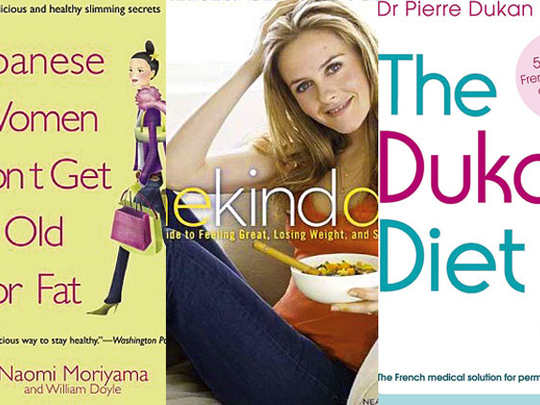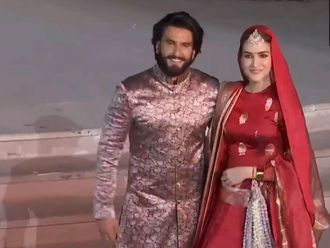
The Fast Diet, Dr Michael Mosley and Mimi Spencer
If you can’t stick to a diet for more than a couple of days then this is the regime for you. First, the tough bit: for two days a week you reduce your calorie intake dramatically (to 500 calories for women, 600 calories for men). But these two days of penance allow you five days of pleasure when you can eat whatever you like (within reason) the rest of the week. Stemming from a 2012 BBC documentary by Dr Mosley, the medical journalist behind the book, it’s rapidly gaining fans across the world. While the concept is simple enough for you to follow without buying the book, it does contain useful recipes as well as information on scientific studies that show sensible fasting can help you lose weight and even reduce the risk of age-related diseases.
The Dukan Diet, Dr Pierre Dukan
French women are renowned for being effortlessly in shape, and it’s all down to the Dukan diet – or so Dr Pierre Dukan would have you believe. Starting with an attack phase of eating only protein for a week, the clincher is its promise that once you reach your goal weight, you can end up eating whatever you like, barring one protein-only day a week. First published in France in 2000, Dukan says his concept of ‘protein-only Thursdays’ is so ingrained in the culture that if you go into a Parisian restaurant on
a Thursday afternoon there’s not a pomme, frite or legume in sight. It took 10 years from its publication date for it to hit global headlines, but with the likes of Gisele Bundchen and Kate Middleton said to be fans, the spin-off recipe and companion books are still selling like (healthy) hot cakes.
The Atkins Diet, Robert Atkins
Based on a paper published in 1958, this is the original high-protein plan, which allows you to eat as much meat, cheese and butter as you like, so long as you steer clear of anything containing sugar or carbohydrates. It taps into the fat-burning power of ketosis – when the body switches from metabolising glucose as energy to converting stored body fat to energy. While it’s had its fair share of criticism – after all, gorging on nothing but red meat and cream sounds like the recipe for a heart attack! – it can have staggering results for those with the willpower. Vegetarians should steer clear.
The Emotional Eater’s Repair Manual, Julie M Simon
Have you ever intended to have just one biscuit and then find you’ve eaten the whole pack? Such a so-called lack of willpower has much deeper and more complex roots than mere greediness, suggests therapist and life coach Julie M Simon. Deprivation and guilt are the worst things for an emotional eater, who will only end up resorting to comfort foods once the restriction gets too much, according to her. Instead, Simon offers a practical guide to help balance the needs of your body with those of your mind to counter the impulse to overeat. Full of healing self-care tips, it aims to help you swap the comfort of food with comfort that comes from within.
Japanese Women Don’t Get Old or Fat, Naomi Moriyama
Tokyo-raised Moriyama got the idea for her book after moving to the US to study, where she gained 11 kilograms eating a typical Western diet. Returning home, she found the fat melted away once she reverted to the healthy diet of her homeland. Far from being all about raw fish, this book is everything to do with savouring all types of food and nothing to do with self-deprivation. It includes colourful anecdotes about Japanese life, alongside advice on the health-giving benefits of key ingredients and instructions on how to prepare dishes that range from the very simple to the more elaborate. Not quite a recipe book, nor a novel, it blends useful information with escapism to help inspire you to lead
a healthier lifestyle.
The Kind Diet, Alicia Silverstone
Fans of the 1995 film Clueless might never have imagined they’d be taking health advice from the actress playing the airheaded heroine, but Alicia Silverstone’s Kind Diet was a huge New York Times best-seller when it first came out in 2011. Far from being a grab at the limelight from an ex-A-lister, this is a serious and considered manifesto for the vegan diet from the actress, who is also a committed conservationist and activist. While giving up all meat, eggs and dairy might seem drastic, the book recognises the value of varying degrees of veganism – from the ‘flirts’ who just reduce their meat intake and make a few plant-based swaps, to the ‘superheroes’ who fly headfirst into the macro-biotic lifestyle. Weight loss and clear skin are just some of the pleasing side effects of the Kind Diet, which is also concerned with reducing the wastage of fuel, water and resources connected with mass food production.
Neris and India’s Idiot-proof Diet, India Knight and Neris Thomas
Aimed at normal, busy people who like food and don’t have time to cook elaborate meals, the idea for Knight’s and Thomas’s book came about when they realised they’d both got a bit plump or, as Knight puts it, “Really fat, like UK size 22”. They decided to do something about it, but the diet books they came across were negative and berating. “Their basic premise was ‘You’re a fat freak and you’re killing yourself’,” says Knight. So the friends decided to write their own, positive diet book. “We
start off with the premise that you’re pretty fabulous, and that you’re going to be even more fabulous when you slip into that dress you thought you’d never in a million years fit into,” says Knight. Combining delicious low-carb recipe ideas along with jokes and before-and-after photos of the authors, this book sets out to be an encouraging friend on your weight-loss journey.
I Can Make You Thin, Paul McKenna
For those looking to lose a few inches, it’s hard to ignore the bold claim of this title. The fact it comes from one of the world’s most celebrated self-help gurus makes it even better. But surely its boasts to help you lose weight without calorie counting or fighting cravings are too good to be true? Using techniques borrowed from Neuro Linguistic Programming and hypnosis, this CD-and-book combo sets out to reprogram your mind and, as a result, your relationship with food, so that you won’t want to overeat or binge on the wrong things any more. While the text is refreshingly jargon free and sensible, actual results seem to vary from person to person. But if you consider hundreds of rave reviews on Amazon.com, it certainly seems to live up to the hype for many.
The Blood Sugar Solution, Dr Mark Hyman
Balanced insulin is key not only to preventing diabetes but also warding off heart disease, cancer, stroke and dementia, according to Dr Hyman. His seven-step plan to UltraWellness explains the myriad lifestyle and environmental factors that influence our biology, creating imbalances that are, Dr Hyman believes, the real cause of disease. With lots of technical and medical detail, it’s centred on Dr Hyman’s firm belief that what’s on our grocery list is more important for our health than what is in our prescription pill bottles. It comes with recipes and shopping lists, although its emphasis on clean, unprocessed, GM-free foods requires careful shopping.
The Headspace Diet, Andy Puddicombe
‘Mindfulness’ is one of the latest well-being buzzwords of 2013, with famous fans such as Gwyneth Paltrow espousing its many benefits for body and mind. The mindful eating proposed in The Headspace Diet is just one aspect of mindfulness in general, and taking just 10 minutes a day to practise these meditation-style techniques can have a profound effect on your shape and overall health, says Puddicombe. If you’ve ever experienced guilt about food or know deep down you sometimes eat for the wrong reasons, this book helps you achieve your ideal weight in a manageable way. Find out whether you’re a ‘binger’ or a ‘bear’ kind of eater, and ultimately end up enjoying your mealtimes
a lot more.








